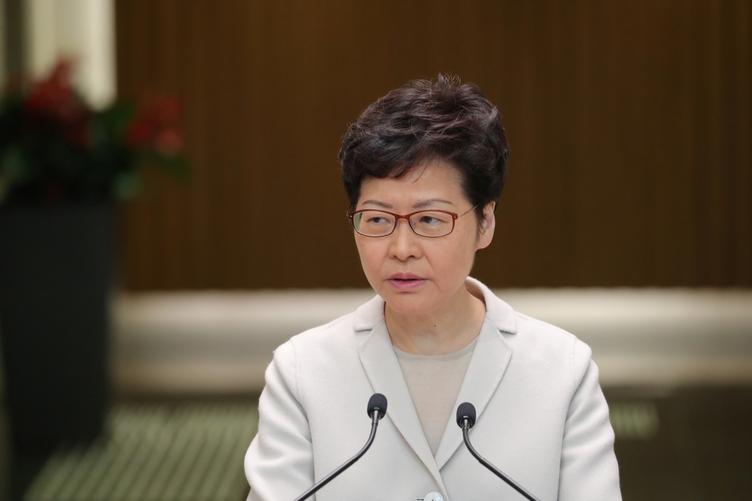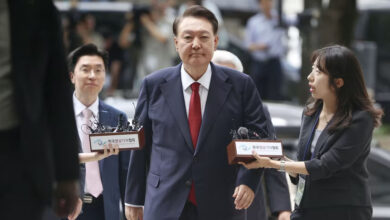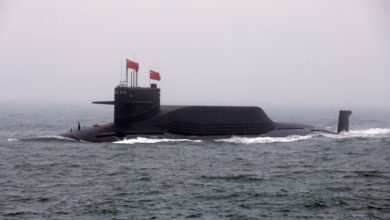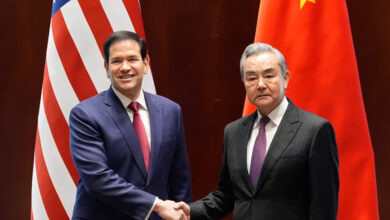
HONG KONG (Reuters) – Hong Kong leader Carrie Lam renewed her appeals for peace in the Chinese-ruled city on Friday but failed to offer any concessions to anti-government protesters despite a resounding victory for pro-democracy parties in local elections.
Appearing tired and drawn, Lam spoke a day after results showed democratic candidates secured almost 90 percent of 452 district council seats in Sunday’s elections, which were widely seen as a barometer of the opposition to the Beijing-backed politician following months of unrest.
China, which has blamed foreign forces for fomenting unrest, has not directly commented on the results, and news outlets in its tightly controlled media largely avoided detailed reporting of how Hong Kongers voted.
On Tuesday, top diplomat Yang Jiechi condemned the passing of US legislation supporting protesters, saying China had “expressed our severe position to the American side,” according to state news agency Xinhua.
A day earlier, the foreign ministry summoned US Ambassador Terry Branstad to protest the Hong Kong Human Rights and Democracy Act, which it said amounted to interference in an internal Chinese matter.
Lam acknowledged that voters in the city wanted to express their views on many issues, including “deficiencies in governance”.
She thanked people for voting peacefully and hoped the calm weekend was a signal that residents want an end to unrest that has convulsed the city for six months.
“Everybody wants to go back to their normal life and this requires the concerted efforts of every one of us,” Lam said during her weekly address at the government’s headquarters.
“So, as I have said repeatedly, resorting to violence will not give us that way forward. So please, please help us to maintain the relative calm and peace…and provide a good basis for Hong Kong to move forward.”
LULL IN VIOLENCE
The international financial center – a business and trade gateway for China – has been rocked by six months of often violent anti-government unrest that has plunged it into its biggest political crisis in decades and poses the greatest internal challenge yet faced by China’s President Xi Jinping.
The Chinese leadership has set up a crisis command center on the mainland side of the border, people familiar with the matter said.
Protests have sprung up on an almost daily basis since June, with crowds gathering with little notice, at times forcing the government, businesses, schools and even the international airport to close.
The violence had escalated up to last week, with protesters hurling petrol bombs and firing arrows at police who responded with tear gas and rubber bullets. Police say they have shown restraint in the face of potentially deadly attacks.
Demonstrators are angry at what they see as Chinese meddling in the freedoms promised to the former British colony when it returned to Chinese rule in 1997.
China denies interfering and says it is committed to the “one country, two systems” formula put in place at that time.
UNIVERSITY STANDOFF
While calm has descended across most of the city, a handful of protesters remain holed up in Polytechnic University, surrounded by police following clashes at the campus on Kowloon peninsula in the run-up to elections.
In her speech Lam urged them to leave peacefully as soon as possible.
On Tuesday, university staff combed the campus looking for holdouts, finding one female protester who appeared “physically weak and emotionally unstable”, the university said.
“Although only a few are left on campus, they are still our citizens. It’s a humanitarian crisis, and they are scared and in emotional crisis,” said lawmaker and district councillor Roy Kwong.
The Cross-Harbor Tunnel linking Hong Kong island to the mainland, which closed after protesters occupied the campus, will re-open on Wednesday morning, chief secretary Matthew Cheung said.
Government teams spent days cleaning the area, which he said looked like a “war-zone”, with fire hydrants and toll booths destroyed.
The anti-government demonstrations bolstered support for democrats in Sunday’s elections, with a record three million people casting their vote.
The pro-democracy parties overwhelming victory poses a conundrum for Beijing and piles pressure on Lam, who is facing renewed calls to step down. The democrats took control of 17 out of 18 district councils.
The councils have limited influence, dealing with local issues such as services. At the top end of government, the chief executive is not directly elected and is advised by an Executive Council, while the law-making Legislative Council is partially elected, with some seats reserved for a “special interest” groups such as business.
Some analysts say Lam, who came to power in 2017 on a platform to heal social divisions, is out of touch with the population and will not say anything concrete unless Beijing gives her the green light.
“There’s no content in her talk, which is usual,” said Ma Ngok, political scientist at Chinese University of Hong Kong.
“The majority of the people still support the (pro-democracy) movement so it is up to them (Beijing) to respond. If they don’t respond with any kind of concessions, I think the protests would go on for some time.”
Reporting By Clare Jim, Jessie Pang, Sharon Tam, Marius Zaharia and Noah Sin; Writing by Anne Marie Roantree & Poppy McPherson; Editing by Paul Tait, Simon Cameron-Moore and Angus MacSwan
Image: Hong Kong chief executive Carrie Lam speaks to the media in a weekly news briefing after local elections in Hong Kong, China, November 26, 2019. REUTERS/Marko Djurica




